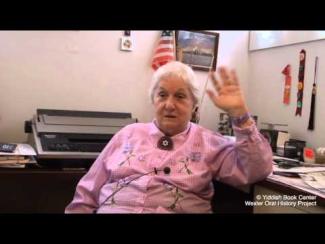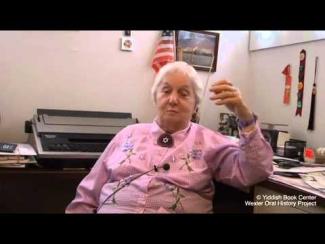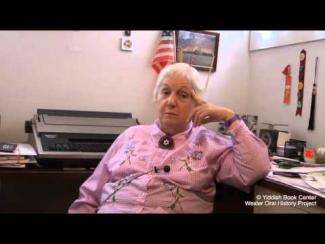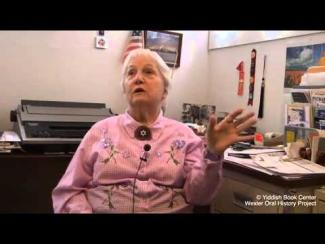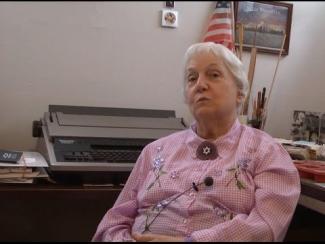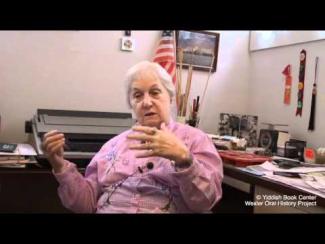The Yiddish Book Center's
Wexler Oral History Project
A growing collection of in-depth interviews with people of all ages and backgrounds, whose stories about the legacy and changing nature of Yiddish language and culture offer a rich and complex chronicle of Jewish identity.
Chana Schachner's Oral History
Chana Schachner, z"l, educator and former Boiberik camper and staff member, was interviewed by Pauline Katz on April 7, 2011 at her home in Hicksville, New York. Chana's parents grew up and married in Bedzin, Poland, and came to New York in 1923. Her mother and older sister briefly returned to Poland during the Depression but returned as the economic situation deteriorated in Eastern Europe. Chana's mother became a huge advocate for the United States. Chana attended a very left-wing shule from age six through 14 which did not jive with her parents' politics, as her father was a Bundist active in the furriers' union and her mother a Labor Zionist. She then became involved with the Sholem Aleichem shule movement, which was a better fit. She attended the Lerer-Seminar [Teachers' Seminary] run by the Farbund Shuln and was awarded a diploma to teach Yiddish. Chana met her husband Yechiel in the Sholem Aleichem schools. They had two children, one of whom died of cancer as a young child. They are secular atheists but steeped in Jewishness and Yiddishkayt which are central to their lives. Chana talks at some length about Leibush Lehrer, head of the Sholem Aleichem shule movement and of Camp Boiberik. Lehrer's ideology was that children should celebrate the Jewish holidays and learn from their rich Jewish heritage without saying prayers or focusing on God, and Chana has followed his lead. She thinks that Jewish institutions' insistence on the connection between Jewishness and Judaism has turned many people away from those institutions as well as from Yiddish culture. At one point Chana was the director of a Sholem Aleichem Sunday School; she still gives lectures in Yiddish on Jewish history at area temples and Jewish Community Centers. She describes her "day jobs" in education and social services. She and her husband became owners of a drafting and design and then an office workers' training program and are now retired. Chana's son attended shule through mitlshul. She feels that assimilation has been the biggest challenge to American Jewish identity and notes that Jews had an entire rich culture that had nothing to do with religion. She considers Yiddish as a post-vernacular language – only a small percentage of Jews use the language in their day-to-day lives, but it is in some ways still vibrant and alive. In addition to everything else, Chana enjoys making jewelry, some of which incorporates Jewish symbols, and collecting Yiddish songbooks and folk music. She wonders about who she should leave her papers to when she dies. Chana describes what was unique about Camp Boiberik, where she eventually became a counselor and then the director of cultural activities. She describes the "felker yontev" [the Festival of Nations]. She was also culture director at Camp Kinder Ring where she wrote scripts for "shtile ovnt" [quiet evening aka Shabbos] and had the same title at Camp Hemshekh when Zalmen Mlotek was music director. She remembers the extraordinary cultural icons such as Isaac Bashevis Singer and Molly Picon who presented or performed for the staff and adult campers. Chana feels that Boiberik did the best job of all the camps at integrating Yiddish and Yiddishkayt into the camping experience. She and her husband still reminisce about and are inspired by many of the exceptional folks they met in that world.
This interview was conducted in English.
Chana Schachner was born in Bronx, New York in 1930. Chana died in 2021.

